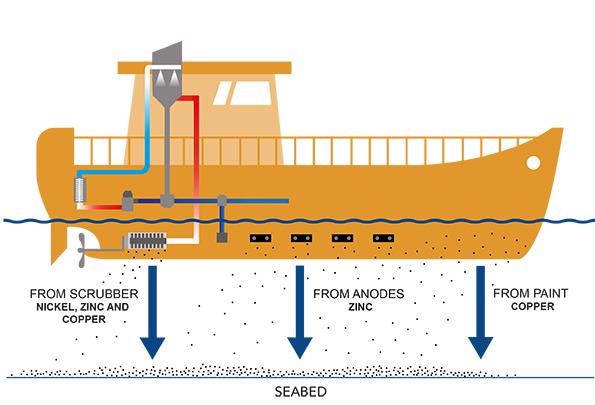Feb 25 2021
According to a new study, ships are considered as the polluting 'elephants in the room' and there has been no debate on this in spite of a worldwide drive to make oceans cleaner.
 The elephant in the room: Shipping, from commercial to leisure craft, is adding toxic metals to the ocean. Image Credit: Chloe Rowe.
The elephant in the room: Shipping, from commercial to leisure craft, is adding toxic metals to the ocean. Image Credit: Chloe Rowe.
Almost every vessel, right from commercial vessels to day-tripper yachts, is constantly discharging considerable amounts of hazardous metals into the sea, notes the study.
Performed under the guidance of Dr. Gordon Watson, from the University of Portsmouth, that study falls in line with the launch of the United Nations “Decade of Ocean Science” to concentrate on healthy seas and a 'sustainable blue economy.'
Dr. Watson noted, “It’s ironic that as the world is working really hard to remove plastic pollution, there is, at the same time, highly polluting vessels continuing to pollute the seas right under our noses.”
The United Nations and the world want healthy seas with sustainable ocean policies awash with more offshore wind farms, aquaculture, and sustainable tourism. All those aims are laudable, but toxic metals from shipping, which is critical to all these activities, is a hidden threat to healthy seas and nobody’s really talking about it.
Dr Gordon Watson, Reader in Marine Zoology, University of Portsmouth
Besides educating boat owners on the use of less toxic anti-fouling paints and anodes, Dr. Watson and collaborators call for immediate legislation to guarantee that shipping is front and center of sustainable ocean policies.
The team analyzed data right from the 1980s on the amounts of hazardous metals present in sediments of the English Channel region from more than 300 coastal and offshore sites.
Despite a steady decline in the overall metal contamination levels in the seabed from the 1980s, the period from 2010 to 2013 indicated a surge related partially to particular metals used in shipping activities.
The team evaluated that all vessels from a sailing boat to a cruise liner discharge significant amounts of metals like nickel, zinc and copper, which then get accumulated in the sediments of the ocean.
Copper serves as a biocide used in paints to inhibit the growth of organisms on hulls. Such anti-fouling paints are often recoated to guarantee that the hull is free from encrusting barnacles and other marine organisms that slow down boats, which makes shipping very costly.
Almost all boats have metal blocks fixed below the waterline. These are usually called sacrificial anodes and fulfill the role of degrading first to safeguard the hull from corrosion. These are often made of zinc.
Lastly, more and more diesel-powered ships are being fitted with scrubbers to decrease the emissions of toxic gases into the air. An inadvertent result of this is the release of wastewater including high concentrations of metals like nickel at the time of the exhaust-gas cleaning process.
The English Channel is the busiest waterway in the world and used by hundreds of vessels every day, both leisure and commercial craft. Thus, Dr. Watson considers the study findings as a 'canary in the mine' for global ocean health.
Shipping—both leisure and commercial—will probably increase with the increase in investment in the global blue economy, a bid to guarantee the sustainable use of ocean resources for economic growth, enhanced livelihoods and jobs while conserving the ocean ecosystem’s health.
Journal Reference:
Richir, J., et al. (2020) Three decades of trace element sediment contamination: The mining of governmental databases and the need to address hidden sources for clean and healthy seas. Environment International. doi.org/10.1016/j.envint.2020.106362.